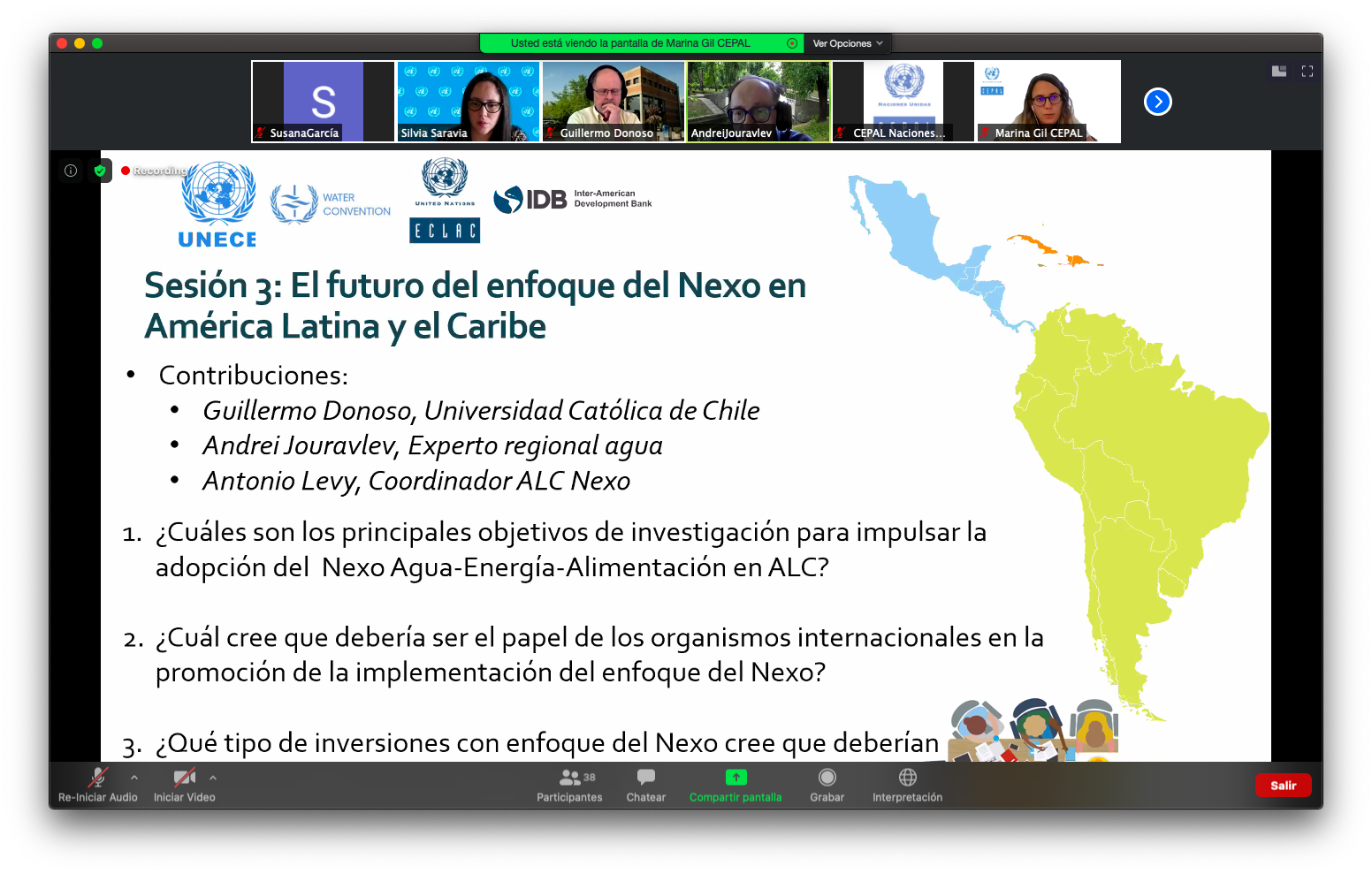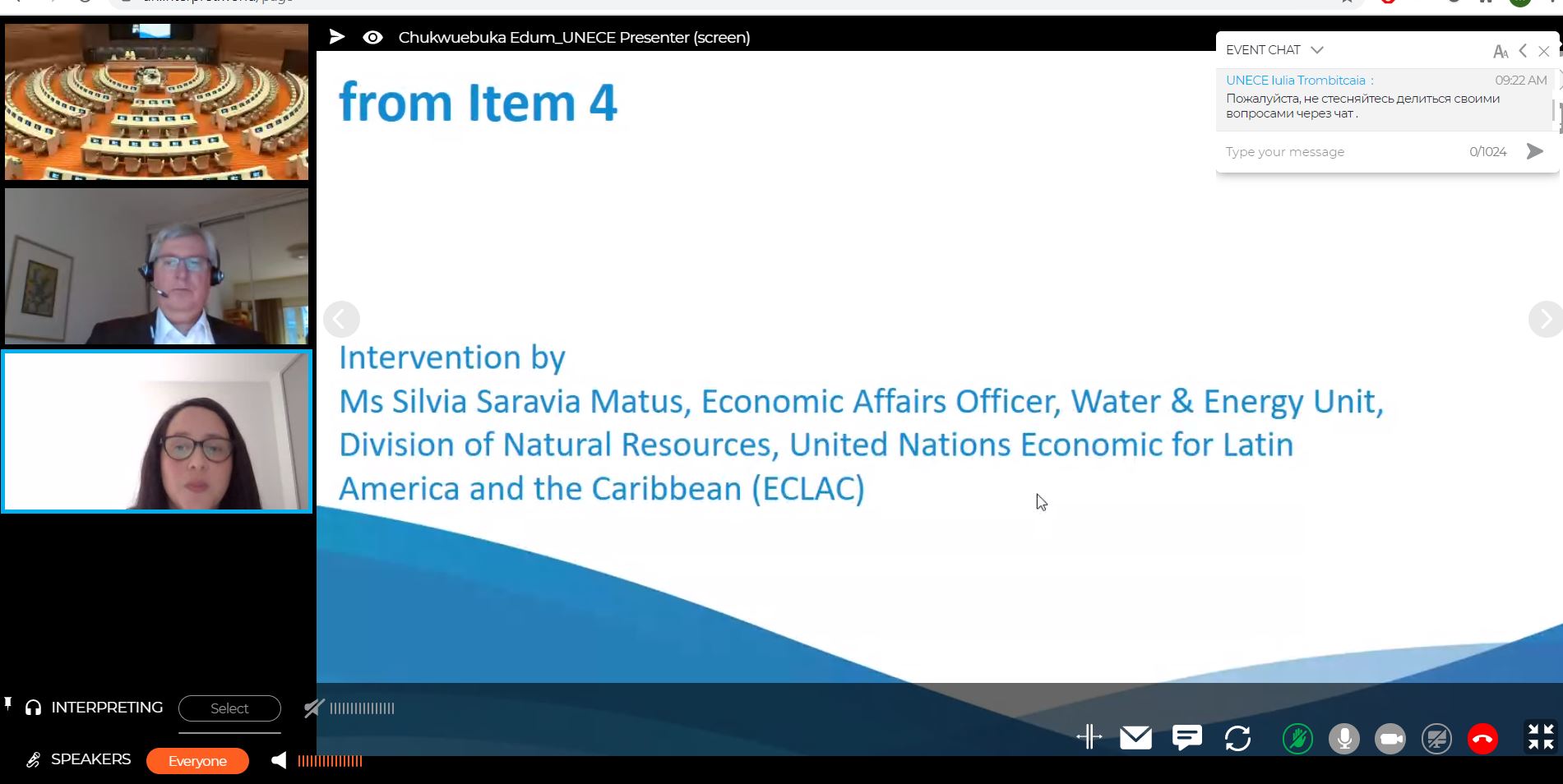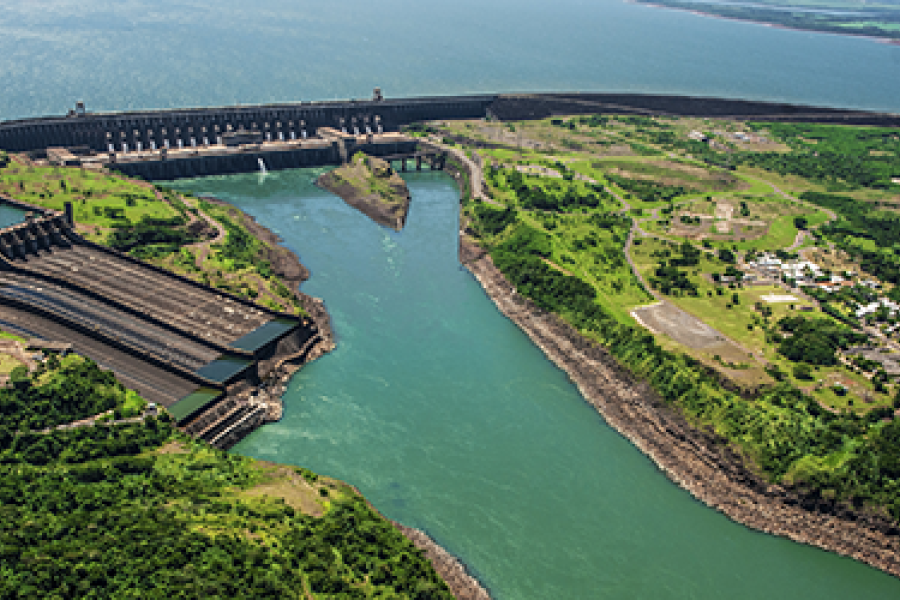Virtual meeting of experts on policies of the Water-Food-Energy-Ecosystems Nexus and projects of transboundary relevance in Latin America and the Caribbean (LAC)
Work area(s)
Topic(s)
Teaser
Virtual meeting on Nexus solutions and investments in transboundary basins in LAC
Event information

Date
26 Feb 2021 - 09:00Event type
Following up on the Sixth meeting of the task group on the Water-Food-Energy-Ecosystems Nexus, held in October 2020 in Geneva, of the Convention on the Protection and Use of Transboundary Watercourses and International Lakes; on February 22, the expert dialogue on Nexus solutions and investments in LAC was held. This was organized by the United Nations Economic Commission for Europe (UNECE), the United Nations Economic Commission for Latin America and the Caribbean (ECLAC) and the Inter-American Development Bank (IDB).
Experts and project managers from multilateral organizations, regional commissions, governmental and non-governmental institutions, and the academic world that are involved in the policy dialogues of the Water-Food-Energy-Ecosystems Nexus or in projects of cross-border relevance in the LAC region, were invited to the meeting.
The objective of the meeting was to initiate a dialogue about the experiences and opportunities for the application of the Nexus solutions, including the investment challenges for the region. Silvia Saravia Matus and Marina Gil, from ECLAC's Water and Energy Unit, began with the presentation of a comparative analysis of actions focused on the Water-Energy-Food Nexus and lessons learned for LAC countries. Next, Annukka Lipponen presented the preliminary UNECE conclusions of the balance of the Nexus solutions and investments in the transboundary basins; opening the way to the debate of Session 1, aimed at discussing Nexus solutions in LAC.
Session 2, moderated by Raúl Muñoz of the IDB, specifically addressed the issue of financing Nexus initiatives in LAC, particularly in the context of transboundary basins. Finally, Marina Gil and Silvia Saravia Matus moderated Session 3, intended to discuss the future of the Nexus approach in LAC. In this session, the participants identified that the three main barriers to the implementation of the Nexus approach in LAC are related to issues of coordination, financing, and institutions. From an academic perspective, Guillermo Donoso (professor at the Catholic University of Chile) emphasized that conceptual frameworks and models are needed to understand the complexity of the Nexus that may moderate a feasible space for co-benefits through more sustainable ways of using natural resources. Next, Andrei Jouravlev (former ECLAC official and regional expert on water issues) highlighted the importance of planning and coordinating international organizations around the Nexus' work in the region. And finally, Antonio Levy (regional coordinator of the GIZ Nexus program for LAC), highlighted the difficulties of putting into practice investments in the Nexus that, although essential to guarantee sustainability, often not all of its benefits are accounted for, particularly the socio-environmental ones.
The outcomes of this consultation will be reflected in forthcoming publications. UNECE will produce in collaboration with the International Union for Conservation of Nature (IUCN) the document entitled: "Balance of Nexus Solutions and Investments in Transboundary Basins"; While ECLAC will publish "Comparative analysis of actions with a focus on the Water-Energy-Food Nexus: Lessons learned for the countries of Latin America and the Caribbean”.
Programme of work
Nexus solutions in LAC
Presentation(s)
"Comparative analysis of actions with a focus on the Water-Energy-Food Nexus: Lessons learned for the countries of Latin America and the Caribbean"
“Balance of Nexus Solutions and Investments in Transboundary Basins”. Preliminary results of the balance sheet exercise and the questionnaire.
Nexus solutions in LAC
1. What is the level of awareness of Nexus issues in the region? And to what extent are intersectoral solutions being applied?
2. Do cross-border cooperation frameworks / programs / projects support the implementation of Nexus solutions? and if so, where and how?
Contributions: Liber Martin, University of Cuyo (Mendoza); Juan Ocola, Binational Autonomous Authority of the Lake Titicaca Water System (ALT); Emilio Cobo, International Union for Conservation of Nature (IUCN); Isabelle Vanderbeck, United Nations Environment Program (UNEP); Ariel Scheffer da Silva, ITAIPU Binacional.
Presentation(s)
Financing the Nexus in LAC
1. What possibilities exist to finance cross-sectoral solutions in transboundary basins? And what are the biggest challenges?
2. How can cross-border cooperation frameworks / programs / projects help unlock cross-sectoral investments in the LAC region?
Contributions: María Alexandra Moreira López, The Organization of the Amazon Cooperation Treaty; Luis Carlos García, the Intergovernmental Coordinating Committee of the Countries of the La Plata Basin; Andres Sanchez, The Organization of American States; Gabriel Baldivieso and Raphael Lenzi, Fonplata; Antonio Embid, University of Zaragoza; Ricardo Medeiros de Andrade, ANA Brazil; Diego Juan Rodriguez, The World Bank; Marissa Castro Magnani, Ministry of Foreign Affairs, Bolivia; Rossana Gaudioso, National Secretary for the Environment, Water and Climate Change, Uruguay.
Presentation(s)
The future of the Nexus approach in Latin America and the Caribbean
1. What is the main barrier to the adoption of the Water-Energy-Food Nexus approach in the region?
2. What are the main research objectives to drive the adoption of the Water-Energy-Food Nexus in LAC?
3. What do you think should be the role of international organizations in promoting the implementation of the Nexus approach?
4. What types of Nexus-focused investments do you think should be selected or prioritized in the region?
Contributions: Guillermo Donoso professor at the Catholic University; Andrei Jouravlev, Regional Expert on Water Issues for Latin America and the Caribbean; Antonio Levy, is the regional coordinator of the GIZ Nexus for Latin America and the Caribbean program.
Presentation(s)
Related content

Participation of ECLAC in the “6th meeting of the Task Force on the Water-Food-Energy Nexus”
ECLAC participated in the “Sixth Meeting of the Working Group on the Water-Food-Energy Nexus”, within the framework of the Water Convention, to share the advances in the adoption of the Nexus…
Attachment(s)
Related project(s)
Organizing institution
Economic Commission for Latin America and the Caribbean (ECLAC)
- https://www.cepal.org
- 56 222100000
Economic Commission for Europe (UN ECE)
- https://www.unece.org/info/ece-homepage.html
- Phone: +41 (0) 22 917 12 34 (switchboard)
Banco Interamericano de Desarrollo
- http://www.iadb.org/es/banco-interamericano-de-desarrollo,2837.html
- (202) 623-1000
